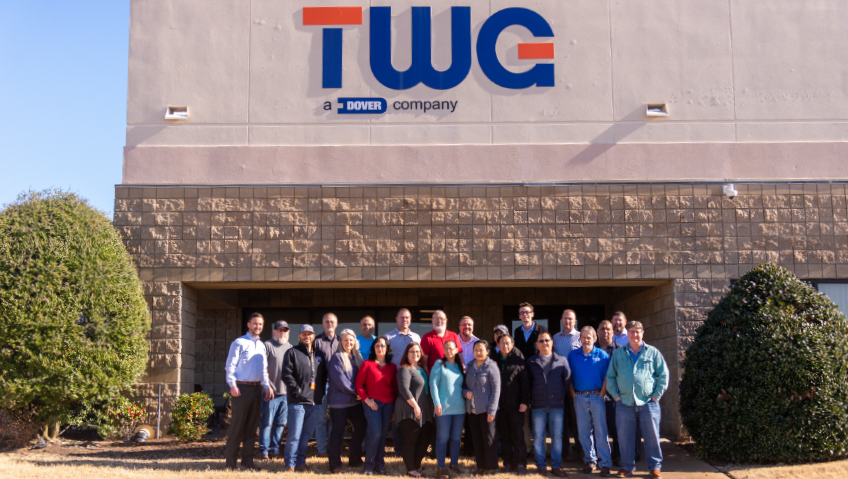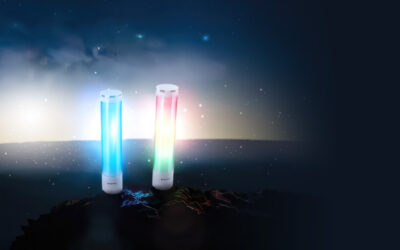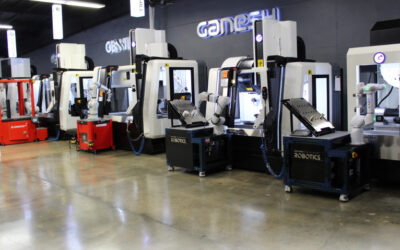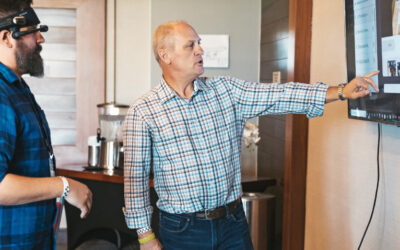For over 90 years, TWG Inc., a Dover company, has been a global leader in manufacturing winches, hoists, slewing ring bearings, swing drives, electronic monitoring systems, and more – bringing industry the power to push, pull, lift, rotate, and control it all electronically.
With headquarters in Jenks, Oklahoma, TWG has a second plant in Surrey, B.C., Canada, and one in Bangalore, India. The company’s proprietary products are assembled and manufactured in Jenks.
Founded nearly a century ago, TWG is today owned by the Dover Corporation of Downers Grove, Illinois.
House of brands
“TWG itself is a house of brands,” says Cody Ward, TWG’s Director of Strategy and Business Development. “Over time, we’ve acquired a number of the top players in this industry.” These include Gear Products, DP Winch, LANTEC, Pullmaster, Tulsa Winch, Greer and RUFNEK.
Now operating as segments of TWG, these brands specialize in products such as hoists, winches, swing drives, slewing ring bearings, and real-time load monitoring solutions. TWG is particularly keen to put the electronic products that are produced under the Greer brand-name front and center.
Load-moment indicator (LMI) monitoring and real-time object monitoring alert systems represent some of the company’s most popular Greer brand-products. Fitted to both construction and utility cranes, these electronic monitoring solutions warn the operator if a crane should begin to have stability problems.
Greer LMI from TWG offers multiple screens, audio and visual alarms, waterproof design, intuitive interface and menus, crane diagnostic and configuration data, and so on. TWG designs and manufactures both hardware and the software for these LMI systems and other Greer electronics.
Manufactured in the USA
“We have our own proprietary control module that we built,” Ward says. “We also built the software that powers it in-house as well. All the manufacturing is done in Jenks, Oklahoma. That’s pretty unique for our space, especially for an electronics product,”
TWG recognizes the strength of the Greer product line and has made significant investments in the revitalization of the brand. “In 2017, we took a hard look at our innovation pipeline and what we want to do, and started to invest heavily in that space,” Ward says. He adds that focusing on Greer products is an excellent way to position the company at the forefront of technological change in the industry.
An eco-system for cranes
“Think about where the world is going and the innovation that’s happening. Digital innovation is outpacing mechanical innovation. So, the opportunities for us to leverage what’s going on in the digital space with Greer products are compelling for us,” explains Ward. “Both for solving problems for our customers and in terms of overall growth.”
Greer electronics also represent something of a springboard to other TWG offerings. “We provide a variety of components to go on a crane – winches, hoists, slewing ring bearings, swing drives – numerous mechanical products,” Ward says.
The idea is to create a crane “eco-system” in which TWG crane products are linked with Greer electronics, an inclusive solution “that brings tangible value for our customers.”
As it is, TWG primarily sells LMI systems to crane manufacturers who serve the construction and utility sectors. TWG also maintains a network of aftermarket distributors.
“Our primary customer is an OEM who is designing a crane. There are also cases in the aftermarket where someone wants to take an LMI system off their crane and put on a different one. Our distributors can assist with that. There is also the wear and tear that goes on in terms of needing new parts. End-users work with both our OEM and our distribution partners in the aftermarket to get their crane back up and running,” says Ward.
Why TWG
Asked why a crane manufacturer should choose an LMI system from TWG over a similar solution from a competitor, Ward cites reliability, versatility and speedy set-up time.
“Greer products have been around for decades and enjoy a reputation for heavy, robust engineering. Also, there are a variety of systems that compete with our product that aren’t as comprehensive in nature as the Greer system. They might tell you the load hanging from the hook, but they don’t tell you the entire force being applied to that crane boom,” he says.
Ward says that when an LMI system is installed on a crane, an initial “calibration process” is required. While “other competitive technologies take days to calibrate, with the Greer system, after the initial installation on a piece of equipment, it takes about four to five hours to get it up and running.”
Other TWG electronics include drum rotation indicators, light bars, torque indicators and wired and wireless anti-two block (WATB) switches for boom protection.
From single winch to full bouquet
The new emphasis on high-tech solutions shows how far TWG has traveled since it was launched in 1929.
Originally called Tulsa Winch Inc., the firm was “founded by a truck-salvage operator who based his original winch designs on the rear-axle gear sets of Ford Model-T trucks,” is how it’s told in TWG corporate history.
In 1996, TWG became part of the Dover Corporation. Since then, TWG (the initials stand for ‘Tulsa Winch Group’) has acquired the companies that make up its current brand portfolio:
• DP Winch specializes in hydraulic planetary gear winches “used for military and conventional applications. Tow-trucks would be the main driver of that,” Ward says.
• The Gear Products brand covers “rotators, slewing ring bearings. Anytime you have an application that’s turning, there’s something we can do for it – excavators, tow-trucks, cranes, you name it.”
• LANCTEC offers heavily engineered solutions including winches for offshore oil applications and theme parks. In a similar fashion, the Pullmaster brand is focused on “marine applications. When you turn on [commercial crab-fishing reality-TV show] Deadliest Catch, the winches you see there are almost exclusively our product. Pedestal crane winches mounted on a boat.”
• Tulsa Winch provides mostly “oil-field based products.”
• RUFNEK brand consists of “a specialty product designed for the oil-field. Winches you almost exclusively see for pulling skids and different things in oil-field,” says Ward.
Tenured in Jenks, Oklahoma
For all the focus on high-tech electronics, TWG is committed to the community and recognizes the importance of maintaining good employee relationships. While it might be cheaper to move manufacturing operations offshore, TWG is determined to keep things in Jenks. There are two main reasons for this: TWG is loyal to its workforce and wants to maintain what Ward calls ‘the pace of innovation.’
“Many of our employees are long-tenured. A 20-year employee is not unusual for us. That experience, we really value. Also, we’re trying to really drive new products to market very quickly. Doing that in-house, literally 150 feet from my office, is extremely helpful. There are no plans to change that.”
For promotional purposes, TWG routinely attends trade shows. The company exhibited at the International Construction & Utility Equipment Exposition (ICUEE) in fall 2019 in Louisville, Kentucky, and will be attending CONEXPO in Las Vegas this March.
At ICUEE, TWG unveiled a new object detection system called Greer Vision, which allows operators to integrate up to four cameras to their display for enhanced visibility and safety. TWG also introduced a new touchscreen for the LMI at the show.
Ward says TWG also has a social media presence, with “brand-focused social media posts” and blog posts focused on specific company brands.
As TWG approaches its centenary, the company is eager to expand the range of its technological solutions.
Load management technology
“Rather than focusing traditionally on LMI like we have in the past, we’re now focused on what we call load management technology. That’s something much broader than purely an LMI offering. So, we’re looking at all the ways we can make a crane operator’s job safer and more efficient. That’s where we’ve expanded the scope of what we’re willing to tackle within that brand,” states Ward.
He thinks the future is going to be “extremely positive” for TWG, “both because of the overall investment that’s been made by Dover in Tulsa Winch Group; growth we’ve seen over the last several years; and because of some of the new digital innovations we have coming down the pipeline,” he shares.
“I think you will look back in three, four, five years and look at the products we’re coming out with and compare with some of the things we’ve done in the past and be extremely surprised by the sheer volume of change that’s happened to us in that period of time.”













